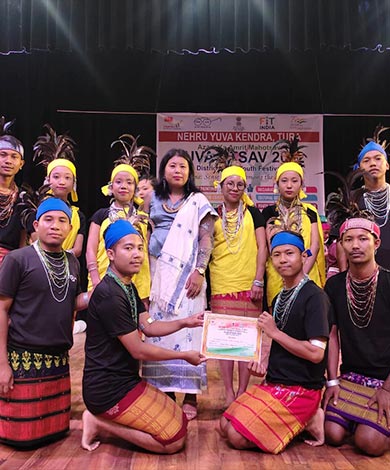Garo
Mission & Vision
- The Department of Garo, established in 2019, initially began with two dedicated teachers, Dr. Dorothy R. Marak and Dr. Colnat B. Marak.
- After their departure in 2020, the department welcomed Mr. Thonobirth G. Momin and Mr. Venybirthseng Ch. Marak in 2021.
- Our mission is to empower students through a comprehensive study of A∙chik Literature, incorporating linguistics, folk literature, and critical literary analysis, including both Western and Indian English literature.
- Our vision is to equip students with a broad and deep understanding of literature, fostering a wide range of knowledge and critical thinking skills.
- We aim to encourage active and extensive research in oral and written literature, culture, tradition, and language.
- Additionally, we strive to develop students' expertise in fiction, drama, and poetry, providing them with authentic information and preparing them to become responsible citizens of the nation

Academic Program
M.A in Garo
Admission Requirements
To gain admission into the M.A. in Garo program, applicants must have secured at least 45% in their bachelor's degree with honors in Garo. The academic session begins in August.
Program Structure
MA Garo Program is organized into 4 semesters in two years. There are 18 courses including a course in Value Education and a Dissertation.
Program Structure of Master of Arts in Garo |
|
|
Semester I
|
Semester II
|
Dissertation |
|
|
Semester III
|
Semester IV
|
Upon admission, students are expected to maintain discipline and adhere to the rules and regulations of ICFAI University. They will engage in various courses as outlined in the department's syllabus. Additionally, students participate in extracurricular activities, including traditional songs and dances, traditional games and sports, and field visits. These activities provide firsthand knowledge of the traditional literature of the communities and help students gain practical experience and expertise.
Graduates of the M.A. in Garo program have various job opportunities in both government and private sectors. Potential careers include teaching positions, journalism, clerical roles, TV anchoring at DDK, positions at DIPR, and roles at All India Radio. Graduates can also pursue further studies and research in their areas of interest. Additionally, there are opportunities for writing, publishing books, and translating various daily, weekly, and monthly newspapers, magazines, and journals from other languages into Garo.
The two-year postgraduate program requires students to conduct research to obtain their degree. Students must choose a topic of interest and submit it to the department. The departmental research committee scrutinizes and approves the submitted topics.
Currently, the department has two regular faculty members and two visiting faculty members.